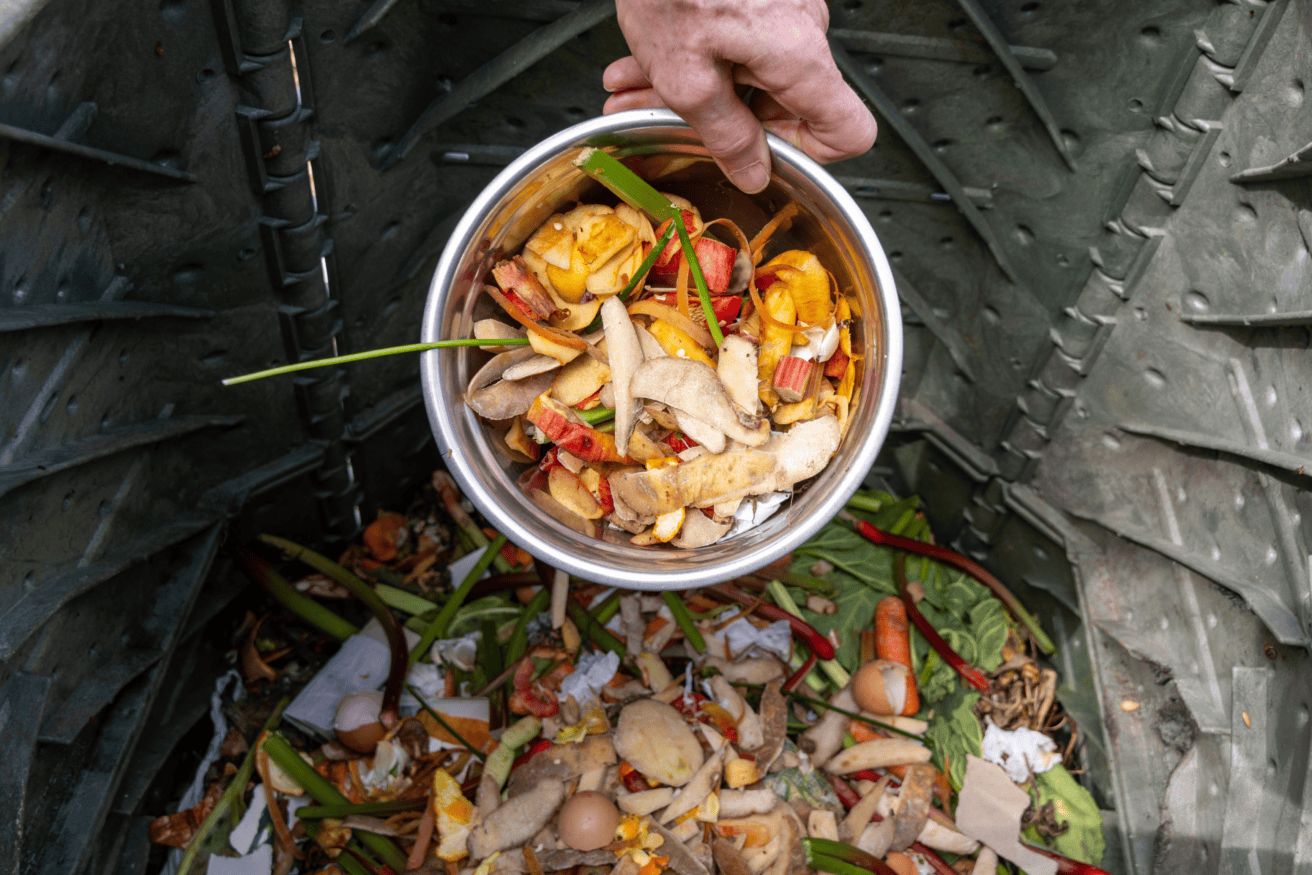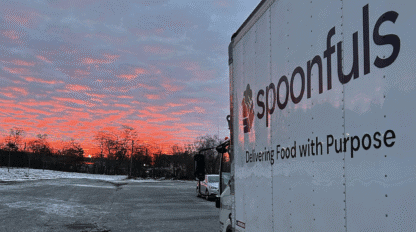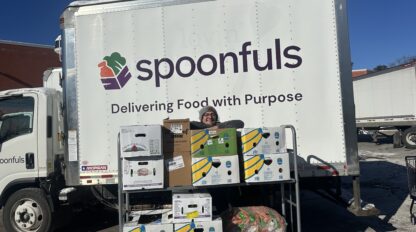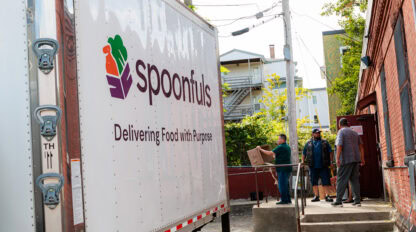What about composting?

When we tell people about our food recovery work, it’s not uncommon to hear questions about composting in response. “Why not compost that food?” “How does composting fit in?” And we love these queries because food recovery and composting are both critical tools for addressing wasted food. Today, we’ll answer all the most popular questions we get about composting and food recovery and discuss the purpose of each (like how, when food is recovered, it ensures food feeds people, and how composting food scraps can help grow more healthy food). Plus, you’ll hear from one local company, Black Earth Compost, with their perspective.
Composting and the Wasted Food Scale
At Spoonfuls, we often reference the EPA’s Wasted Food Scale, which outlines the most to least preferred methods of managing excess food to minimize environmental impacts. We won’t unpack the details of the Scale in this blog, but the visual below helps to illustrate how some of the strategies we discuss here play together.
The scale affirms that, next to preventing wasted food from occurring, still-edible food should be donated or upcycled. In this way, the scale prioritizes people (then animals), ensuring that food, first and foremost, nourishes life. And, as such, food recovery, like what we do at Spoonfuls, directly aligns with the scale’s framework.

Composting follows, as a great option for food that can’t be consumed. Think: Inedible food, like corn cobs, or food that is unsafe to eat, like leftovers that were forgotten in the back of the fridge and have started to mold. As much as possible, food should be consumed while it’s still good to eat, but untimely spoiled food occasionally happens to even the most food waste-conscious among us. That’s where composting comes in! Read on to learn why composting inedible food is better for the environment than landfilling.
What happens to food that’s composted?
To answer this question, we’re roping in local compost experts, Black Earth Compost, a company that composts 18,000 tons of food in Massachusetts annually. Here’s what they had to say:
“Food that is composted undergoes aerobic decomposition as it breaks down. Once composting is complete in about six months, the food scraps are transformed, and we’re left with a balanced and nutritious soil amendment that can be used to grow even more food. This creates a resilient circular food economy, recycling the nutrients from food scraps back into the soil to grow even healthier food, locally. It’s as if the soil is a bank and composting is an opportunity to make a deposit,” says Justin Sandler, Partner at Black Earth Compost.
How does composting impact the environment?
Composting is most known as an environmentally friendly alternative to landfilling food because it produces significantly less methane, a greenhouse gas 28 times more potent than carbon dioxide, making it better at trapping heat inside Earth’s atmosphere. For this reason, increasing rates of composting is routinely cited as a top strategy for reducing all methane emissions.
But the benefits of composting don’t stop there. Other benefits include:
- Valuable soil amendment: When food has finished going through the composting process, it leaves behind nutrient-rich soil, which can be used to grow new food. Justin at Black Earth Compost tells us this is especially valuable to local farmers. “Choosing local, high-quality compost isn’t just about moving away from costly fertilizers. It’s about sustainably adding life and organic matter materials to [the growing process to] ensure generations of harvest.”
- Less reliant on fertilizers: Many growers rely on synthetic fertilizers to put the necessary nutrients for growing food into the soil. These harmful chemicals are bad for farm workers’ health and result in runoff that pollutes local waterways. Instead, compost can be used as it contains the same key nutrients: nitrogen, phosphorus, and potassium, along with a host of beneficial bacteria and rich biodiversity.
- Water retention: Food needs water to grow, and how much water, in part, depends on the soil quality. In low-quality soil, water evaporates more quickly, which means the soil needs more frequent watering for the plants to have what they need to grow. High-quality, healthy soil, which is made with compost, holds more water and therefore requires less frequent watering to properly hydrate the growing plants. That means when compost is used, food can be grown with less water. This is especially important as we see droughts and floods worsen due to the effects of global warming. Using less water to grow food can help preserve the natural resource, which is especially important during drought conditions. When heavy rain falls, healthy soil can mitigate flood conditions because it can absorb more water that would otherwise sit on top of the ground.
- Takes up less space: Landfills, like those in Massachusetts, are running out of space and are set to close by 2035. The state currently ships trash as far out as Alabama. Municipal composting can drastically reduce landfill inputs, making us less reliant on other states to take our trash.
For more reading on the benefits of composting, check out this article by the NRDC.
Should I put all my excess food in the compost bin?
No. As we mentioned above, you should always try to consume food or share it with others before it becomes waste. That’s the first and best way to maximize the impact of your food and minimize its impact on the environment (remember: growing and processing the food you have already had an impact on the planet).
And we know there’s a lot of food hitting compost bins while it’s still good to eat. “Occasionally, we see whole oranges, heads of lettuce, and even green bananas in the compost we pick up,” shares Andrew Brousseau, Compost Manager at Black Earth Compost. “It’s a much higher-end use to feed people.”
We couldn’t agree more, especially as so many people in Massachusetts are experiencing food insecurity. Many of our neighbors could use that food.
At the level of businesses (like grocery stores with excess, unsalable product), Spoonfuls works to intervene, recovering food for people who could use it before food becomes waste. However, 33% of food is wasted in homes (ReFED).
So, lean into prevention to ensure you’re making the most of your food while it’s still good to eat. (Our Food Waste Challenge can help with that.) When your food can truly no longer be consumed because it’s scraps, has spoiled, etc., go ahead and toss it in the compost bin.
Bottom line: Prevention, like donation through food recovery organizations or pantries, and composting, are even better at tackling the impacts of wasted food when used together.
How do I compost?
Check with your town
Municipal-run, or funded, compost programs are rising in popularity as communities look to take collective action against the climate emergency. The trash and recycling section of your town’s website is likely the place to start. Boston, Natick, and Worcester are all examples of towns that offer curbside or drop-off composting for free to their residents. Do your research though. Some municipal food scrap collection programs send scraps to anaerobic digestion, which is a different end destination than composting and one that is a lower priority on the EPA’s Food Waste Scale discussed above.
Many other towns, like Longmeadow, offer low-cost compost bins for residents interested in managing their own compost (see “Do it yourself” below).
If your town isn’t offering a compost program yet, or you’d like to see them expand on their existing one, ask them to! As a resident of your town, you have the power to advocate for these programs. Shoot your town officials an email, or even better, speak up at your next town meeting.
Do it yourself
For those without town composting programs or who enjoy DIY projects, there are ways to approach composting to fit into any lifestyle. Apartment dwellers included! Check out this NPR Life Kit article for some ideas.
Use a curbside compost service
For those who prefer not to manage their own compost pile and whose towns don’t have a municipal-funded program, you might consider opting into a curbside compost service that allows individuals to sign up for a self-funded option. These services operate similarly to municipal trash and recycling programs, where households collect food scraps in a bin and later put the bin outside for the compost company to collect the scraps. Often, the more households in a town participating in self-funded curbside compost pick-ups, the more likely a town is to begin a municipally funded program because it shows their residents have an established interest in composting.
At Spoonfuls’ office, we set aside our food scraps for collection by Black Earth Compost. Other compost services in Massachusetts include Bootstrap Compost, City Compost, and The Compost Cooperative. Pick the one that’s best for you.


